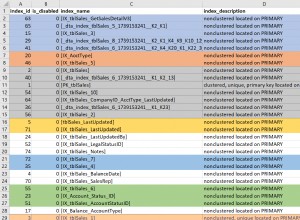Ab PostgreSQL 9.4 können Sie den ? verwenden Betreiber:
select info->>'name' from rabbits where (info->'food')::jsonb ? 'carrots';
Sie können sogar ? indizieren Abfrage nach "food" Schlüssel, wenn Sie zu jsonb wechseln geben Sie stattdessen ein:
alter table rabbits alter info type jsonb using info::jsonb;
create index on rabbits using gin ((info->'food'));
select info->>'name' from rabbits where info->'food' ? 'carrots';
Dafür haben Sie als hauptberuflicher Kaninchenhalter wahrscheinlich keine Zeit.
Aktualisierung: Hier ist eine Demonstration der Leistungsverbesserungen an einem Tisch mit 1.000.000 Kaninchen, wobei jedes Kaninchen zwei Nahrungsmittel mag und 10 % davon Karotten mögen:
d=# -- Postgres 9.3 solution
d=# explain analyze select info->>'name' from rabbits where exists (
d(# select 1 from json_array_elements(info->'food') as food
d(# where food::text = '"carrots"'
d(# );
Execution time: 3084.927 ms
d=# -- Postgres 9.4+ solution
d=# explain analyze select info->'name' from rabbits where (info->'food')::jsonb ? 'carrots';
Execution time: 1255.501 ms
d=# alter table rabbits alter info type jsonb using info::jsonb;
d=# explain analyze select info->'name' from rabbits where info->'food' ? 'carrots';
Execution time: 465.919 ms
d=# create index on rabbits using gin ((info->'food'));
d=# explain analyze select info->'name' from rabbits where info->'food' ? 'carrots';
Execution time: 256.478 ms




